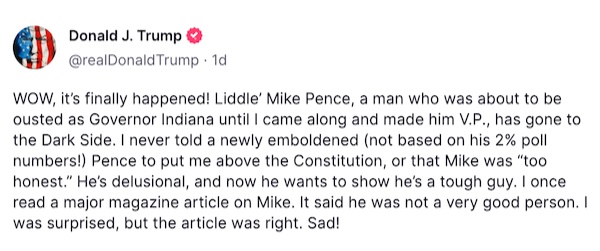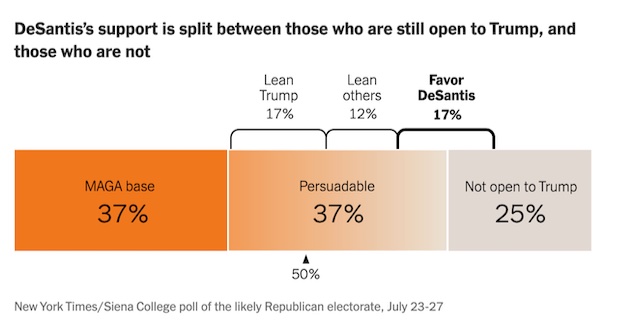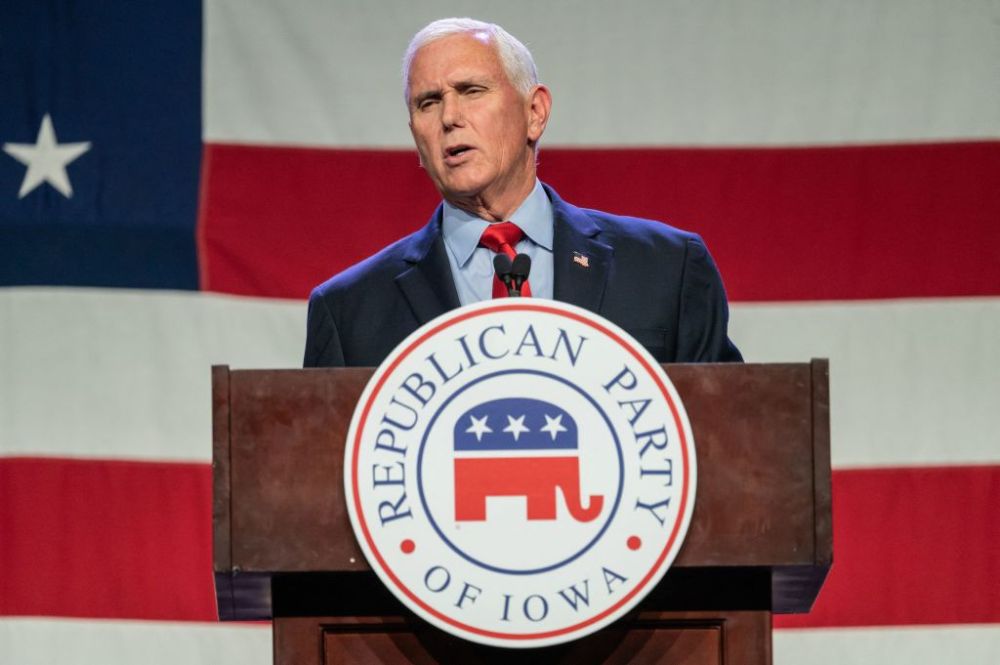Strange but true fact about a race in which the frontrunner is 40 points ahead: Few Republican presidential candidates are panicking about the state of the primary, and for good reason.
Some are running to be vice president, others for a gig on Fox News. A few are running on a lark, because they feel compelled to make a moral case against Donald Trump on the grandest stage available. The size of Trump’s lead doesn’t matter to any of them. If he’s still 40 points ahead on New Year’s Day, it won’t matter then either.
It does matter to the two credible-ish challengers in the field, Mike Pence and Ron DeSantis.
Pence is the best-known contender in the race apart from Trump himself, an experienced public servant with impeccable Christian and conservative credentials who’s sunk so deeply into irrelevance that he trails Vivek Ramaswamy. He has yet to qualify for the first primary debate, something even Doug Burgum managed to do.
DeSantis was polling north of 30 percent nationally as recently as March 31. He’s lost almost half his support since then, falling to a campaign-worst 15.7 percent in today’s RealClearPolitics average. Donors are antsy and staffers are reportedly demoralized. If he doesn’t turn things around lickety split he could lose his halo as the Great Anti-Trump Hope and see his support collapse.
For most of the field, it’s early. For Pence and DeSantis, two ostensibly formidable candidates who seem anything but, it’s late. They can keep doing what they’ve been doing and flame out ignominiously or they can take risks that might (but probably won’t) reverse their fortunes.
This past week, having nothing left to lose, they began to take risks—with, of all things, the “rigged election” of 2020.
Pence and DeSantis share another distinction besides underwhelming polling. They’re the closest thing to “hybrid” candidates in a race populated by ardent populists like Trump and Ramaswamy on the one hand and traditional conservatives like Tim Scott and Nikki Haley on the other. They arrived at that destination by different routes: DeSantis painstakingly remade himself into a culture warrior as governor whereas Pence leached a bit of MAGA credibility from his former running mate. When the former VP reminds Republicans of the achievements of the “Trump-Pence administration” on the trail, there’s a reason.
The 2020 election is an especially touchy subject for the hybrid candidates, who aim to build a coalition of populists and traditional conservatives. Sound too approving of Trump’s attempts to overturn the election and you might alienate the latter; sound too disapproving and you might offend the former. (Like, really offend them.) DeSantis and Pence would prefer to avoid the topic, no doubt, and would do so if they were polling more strongly.
But between their electoral predicament and Trump’s legal predicament, neither has a choice. Once last week’s indictment was handed down, the two seem to have recognized that they’ll spend the rest of the month facing questions about the post-election period. It’s a cinch, in fact, that all Republican candidates will be asked at the first debate on August 23 whether they believe the 2020 election was stolen and whether Mike Pence did the right thing on January 6.
Some aren’t ready for those questions yet. But Pence and DeSantis are getting ready, leaning into the subject for their own strategic reasons.
For Pence, having the topic of January 6 thrust upon him once again is a mixed blessing. Granted, it gives Trump devotees that much more reason to yell “traitor” at him at his campaign events, but that was going to happen regardless and will continue for the rest of his life. The upside of Jack Smith’s latest indictment, as my colleagues at Dispatch Politics noted this morning, is that it also gives Pence something he’s lacked to this point: relevance.
The former VP is newsworthy again. And he’s taking advantage.
When reporters asked him last week about the new charges, Pence criticized Trump’s “itching ears” for having been too receptive to what his “crackpot lawyers” were telling him before January 6. “Itching ears” is a phrase from the Bible; that was Mike Pence communicating to evangelicals, very belatedly, that it’s time to regain their moral bearings about Trump and his coup attempt.
He’s gone further than just defending himself in interviews. According to the new indictment, when Pence refused to join Trump’s scheme to reject electoral votes from swing states won by Biden, Trump told him, “You’re too honest.” Shortly after the indictment was published, this appeared in Pence’s online campaign store.
He might just sell enough of that merchandise to push him over the donor threshold needed to qualify for the first debate.
All of this makes Pence’s “I’m not sorry” approach to January 6 seem … surprisingly shrewd to me under the circumstances.
Not “shrewd” in the sense that it’ll get him closer to the nomination, a possibility that was foreclosed when he behaved honorably at the Capitol that day. I mean shrewd in the sense of making the best of the terrible hand he’s been dealt, which may soon involve being subpoenaed to testify against Trump at trial as Smith’s star witness. The most Pence can do at this point to extend his political career (a little) and his political influence (a lot) is to make the civic case against Trump’s coup attempt unapologetically, with dignity. He’ll earn more respect than he loses by doing so.
And he’ll draw the wrath of a certain someone whose anger will inadvertently elevate Pence to a position of greater prominence in the race. In fact, he already has:

I wouldn’t bet much on Mike Pence emerging as the last man standing against Trump next winter, but I’d bet a bit more on it today than I would have a week ago. As badly as January 6 hurt him with Republicans, 44 percent still view him favorably according to the recent New York Times “doom poll.” If a chunk of them can be consolidated, that’s a decent-sized base.
Should everything break right for the former VP, I believe in my heart that he can close the gap with Trump to 75-25 by Super Tuesday.
Ron DeSantis’ exposure on the subject of the “rigged election” isn’t as obvious as Pence’s but it’s real and it’s spectacular. The governor’s strategy from the start has been to out-Trump Trump by taking a more populist position than the frontrunner wherever possible—on vaccines, on COVID precautions, on abortion, and so on. Rightly or wrongly, DeSantis believes he can carve off chunks of the MAGA base by passing all of their litmus tests while delivering more for them legislatively than the former president ever did.
At the same time, he continues to pitch himself as more electable in a general election than Trump is. The topic of January 6 is the crossroads of that strategy: Will DeSantis go so far in trying to keep pace with Trump on the right that he’ll endorse conspiracy theories about the 2020 election? Or will he choose to fail the ultimate populist litmus test in the name of preserving his viability with swing voters as a more or less “sane Republican”?
Smith’s indictment gave reporters an excuse to corner him on the subject. For once, DeSantis has chosen to fail the litmus test—sort of.
Quote: “It was not an election that was conducted the way I think we want to. But that's different than saying, like, [Venezuelan President Nicolas] Maduro stole votes or something like that. And I think those theories, you know, proved to be unsubstantiated."
On Monday DeSantis sat with NBC reporter Dasha Burns, who pressed him again on the subject.
"Whoever puts their hand on the Bible on Jan. 20 every four years is the winner,” DeSantis says. Hmmm.
Because they’re “hybrid” candidates, he and Pence are each trying to have it both ways on this topic. Notice, for instance, in the video above how Pence reserved his harshest language—“crackpot”—for Trump’s lawyers, not for Trump himself. Even now, two and a half years after his near-death experience, the former VP takes care not to antagonize devotees of his former boss more than he has to.
But Pence has also said that no one who puts himself above the Constitution should ever be president, a surprisingly forthright attack on Trump’s fitness for office by Republican standards. DeSantis is unlikely to ever be that bold because he has more to lose by doing so: Millions of populists who soured on Pence long ago still admire the governor of Florida, even if they prefer the other Floridian in the race.
So DeSantis has to “finesse” his messaging, shall we say, on the subject of the 2020 election. To reassure swing voters that he’s not insane, he’ll allow that there was no grand conspiracy theory to steal votes. To reassure Republican primary voters that their grievances are justified, he’ll insist that the rules of the election were unfair. (The same rules that were followed in Florida by Gov. Ron DeSantis, by the way.) He’ll concede that Joe Biden is the president, an empirical observation, to placate the normies while dancing around whether Biden was rightfully elected to pander to the kooks. After all, by DeSantis’ definition, if Trump had contrived a way to overturn the result and be sworn in on January 20 he’d be the “winner.”
The governor is trying to be all things to all constituencies by signaling two things at once, that Republicans are right to be suspicious about the integrity of the 2020 election and that everyone else is right to think that the vote wasn’t rigged. Populist and establishmentarian—that’s a true “hybrid” candidate. If DeSantis can’t avoid this subject altogether, that’s the line he’ll try to walk.
And not only that, he’ll try to lay blame for the whole mess at Donald Trump’s feet. Quote:
"But here’s the issue that I think is important for Republican voters to think about: Why did we have all those mail votes? Because of Trump turned the government over to Fauci," DeSantis said, referring to Dr. Anthony Fauci, a leader of the White House Coronavirus Task Force. "They embraced lockdowns. They did the CARES Act, which funded mail-in ballots across the country."
…
"If the election is a referendum on Joe Biden’s policies and the failures that we’ve seen and we are presenting a positive vision for the future, we will win the presidency and we will have a chance to turn the country around," DeSantis said.
"If, on the other hand, the election is not about Jan. 20, 2025, but Jan. 6, 2021, or what document was left by the toilet at Mar-a-Lago, if it’s a referendum on that, we are going to lose."
Insofar as mail ballots tilted the outcome in 2020, Trump is to blame. If Republicans end up blowing an otherwise winnable election in 2024 by harping on 2020, Trump is to blame. Not coincidentally, those two points reflect the two grand themes of DeSantis’ campaign—competence and electability vis-a-vis the frontrunner. He’s going to make the “rigged election” nonsense an argument against Trump without resorting to the glaringly obvious point that would offend populist voters, namely, “Trump is glaringly unfit, you idiots.”
Although DeSantis has begun to skirt around that topic too.
He won’t tell them Trump is a bad guy but he will tell them that in many ways, including the 2020 election that’s caused them so much grief, Trump is the cause of their misery. He let you down, DeSantis aims to say, and he’ll do it again.
It is … strange, though, that he would choose this particular moment to go on offense over “Stop the Steal” given how many Republicans have ridden to Trump’s defense after Smith’s indictment. Ron DeSantis has tried so hard to never offend populists, yet suddenly he’s at an enormous risk of doing so.
I think the polling—and donor angst—have left him and Pence no choice but to fundamentally change their approach to the race.
As “hybrid” candidates, DeSantis and (to a lesser extent) Pence have tried to build hybrid coalitions. The governor has leaned heavily into populism in hopes of wooing away a share of Trump’s own voters while trusting that his pre-Trump pedigree will deliver him some normie conservatives. Were he to make gains with Trump’s base and rise in the polls, the race would tighten and the many traditional Republicans who had resisted DeSantis to that point would flock to him as their best hope of ending Trump’s career. Or so his theory of the primary goes.
Inasmuch as Mike Pence has a theory of the primary, it’s a mirror image of that. He’s running as a Reaganite conservative while trusting that his Trump pedigree will attract some disaffected populists. Were he to unite conservative voters and rise in the polls, the race would tighten and other populists who are tired of Trump or believe him to be unelectable would conclude that his former running mate is the closest thing to an acceptable substitution. (This was a lot more plausible before January 6, needless to say.)
Neither theory looks very good lately, does it?
Look back at Nate Cohn’s recent analysis of the Republican primary electorate:

DeSantis has been trying to capture a chunk of the MAGA base while Pence, I think, hoped to pick off some of the lean-Trumpers.
All of that is up in smoke. With Trump’s polling frozen above 50 percent since early April and MAGA voters rallying behind him amid his legal problems, the share of populists whom DeSantis and Pence might feasibly persuade seems exhausted for now. Neither candidate is going to build a sizable hybrid coalition that cuts into Trump’s lead anytime soon. Meanwhile, the clock is ticking.
What each needs desperately is some traction, proof of life in the form of a polling bounce. Emerging as the unquestioned second-place candidate, the probable last man standing against Trump as the field winnows, would be a huge achievement at this point. I think both have concluded that their best chance to do so is by looking for ways to appeal to more Trump-skeptical Republicans. Those voters are still persuadable, after all. The MAGA base is not.
That would be a rerun of 2016, essentially, in which figures like Ted Cruz and Marco Rubio competed to consolidate conservatives in the mistaken belief that they would win a two-man race with Trump once the rest of the competition dropped out. It didn’t work for Cruz and it’s unlikely to work for DeSantis and Pence, but neither can worry about that right now: They would happily trade Cruz’s 35-40 percent share of the vote in that primary for the pitiful numbers they’re currently pulling. “Consolidate the normies, then beat Trump head-to-head” is the failed Plan B you fall back on when your Plan A has failed even more miserably.
So go figure that Pence and DeSantis have turned cautiously more aggressive lately in criticizing Trump over 2020, something that will catch the attention of Cohn’s “Not Open to Trump” group and possibly some of the great “Persuadable” middle.
Polls continue to show that Trump is viewed less favorably by GOP voters now than he used to be, if only modestly, so there is evidence of Republican voters becoming more receptive to criticism of their hero. Two candidates whose fortunes are deteriorating have quite understandably begun to fish in that pond of disenchanteds. If either can build a little momentum among the Trump-averse by rebuking his “rigged election” nonsense, they’ll at least be moving in a direction back toward actual contention. “I think we’re coming to a fork in the road,” Pence said recently in Iowa about the state of the race. I’d say we’re there.







Please note that we at The Dispatch hold ourselves, our work, and our commenters to a higher standard than other places on the internet. We welcome comments that foster genuine debate or discussion—including comments critical of us or our work—but responses that include ad hominem attacks on fellow Dispatch members or are intended to stoke fear and anger may be moderated.
With your membership, you only have the ability to comment on The Morning Dispatch articles. Consider upgrading to join the conversation everywhere.